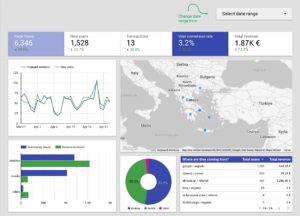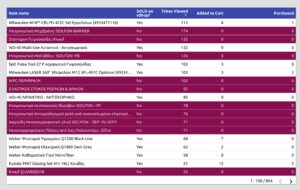Measurable Marketing FAQs
It’s a process of combining data and marketing knowledge to achieve objectives and ultimately your company’s end goal, i.e. Raise sales by 20%. By looking at your data you can gain insights that will help you, as a marketing person or senior executive, to connect the dots, see what works, try new things, focus on what matters, and step by step achieve your target.
By consolidating your diverse datasets you will have an in-depth view of your business activities, from e-commerce, wholesale, brick-and-mortar, to marketing and ad spend. It allows you to gain profound insights, such as understanding the impact of your marketing campaigns on sales figures, assessing profitability by factoring in marketing and ad costs, and even discerning how external variables like search engines or competitor’s marketing efforts influence your sales. These are critical areas where our experts have the technological knowledge to bring the data together, run in-depth analysis, build easy-to-share reports with dynamic visualization, and help your teams make better decisions based on factual insights.
Good question. In our opinion measuring marketing campaigns requires a technical marketer, because you need an expert with technical knowledge and experience but also marketing background to make the most out of what marketing measurements can offer. A knowledgable marketer will create a customer journey based both on the tech and marketing stacks.
While technical marketers may not be programmers they can understand code, what an API is, why you might need an ERP connection, how they will collect data, and even how to store them in a warehouse. They should be able to work with programmers to create the required digital transformation outcomes.
In a world of petabytes of data created every minute, the possibilities are endless. Having said that it does not mean that all data has the same significance for marketing or lead generation. Sources of data should be considered only if they actually bring value to the marketing objectives and end goal. Data can be incrementally utilized and tested on whether it offers valuable insights. The aim should be less for more.
Common data sources in marketing are: Google Analytics, Google Search Console analytics, Socia media analytics, Hubspot, E-commerce data, and many many more. If you’re collecting data somewhere or somehow it may be useful.
We can help you setup data collection. Usually we need a month’s worth of data to start seeing meaningful results. Keep in mind that you may be already collecting data but you are not aware of it. We can help you investigate that.
We use different methods to retrieve data. These may include third party connection services, programming, or scraping. For visualization and reporting we use Looker Studio.
A basic report may start with an overall Dashboard that includes website views, e-commerce conversion rate, revenue, referrals and other basic information.

Complex reports are usually reports that answer specific questions and may need the introduction of different data sources.
For eg. a client selling construction materials asked: Which products did users view on my e-shop and which did they add to the cart?
Also, which products draw interest but they can’t buy, on my e-shop, because I don’t sell them online (they’re only on display)?
We built a report that answered both of these questions, providing details on times viewed, how many times they were added to the cart, and how many purchases overall. It included information (shown below in burgundy) of the products people view but can’t purchase. This helped the client decide if they wanted to make these products available for direct purchase via the e-shop. The client can manipulate the report to check for specific time periods or sort by product category.

No. It depends on the kind of data we have, the source, and the questions we have to answer via our reports. Usually, most reports are automated, which means the client can login and check the latest data, depending on how often the source updates its own data. In cases where we need to build non-automated reports it depends on what the client needs. We can offer daily reports if this is what the client needs and is willing to pay for.
Yes, we can add your logo (e.g. marketing agency), client’s logo, and anything else you may need. Each report occupies it’s own unique link, which you can share with your stakeholders.
Each client report has a unique link and they can access it via a browser. The link remains the same, so they may access the report and see new results at any time. If it includes automated reports these are updated immediately upon opening the report in the browser, as long as there is an Internet connection.
Yes, usually each report is a multi-page report. So it may start with a dashboard, include a top scoring keywords from Google Search Console, and continue with price comparison from a marketplace. Obviously you might need to create different reports depending on the Viewer. An executive who needs high-level information to make decisions fast is not the same as the person responsible for ad spend, or the technician who has to fix 404 (not found webpages) problems. We might have to build multiple reports with different links to accommodate specific needs.


